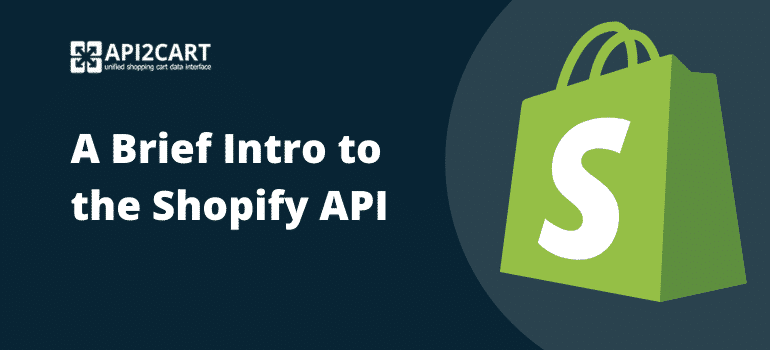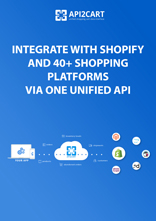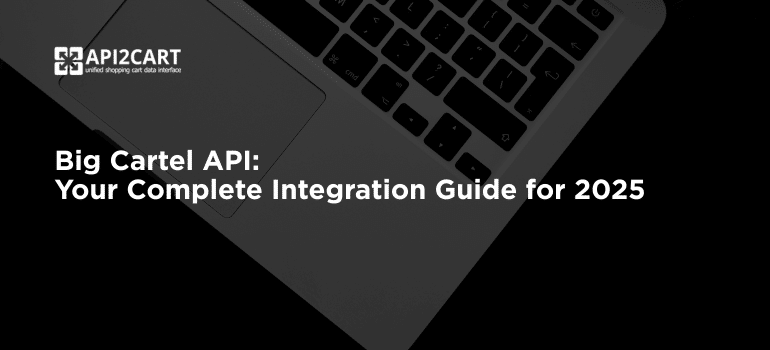
Shopify is one of the leading eCommerce platforms globally, hosting over 4 million active stores as of 2026. For eCommerce software developers, connecting to Shopify is a priority to leverage the platform's vast ecosystem. By using the Shopify API, developers can integrate their solutions to manage store data such as orders, products, inventory, and customer details, while automating processes and enhancing the overall user experience. Whether you're building a custom solution for order management or synchronizing inventory, the Shopify API Integrstion offers the flexibility and scalability needed to seamlessly integrate Shopify with other systems.
However, like any major eCommerce platform, Shopify has its own challenges and unique features. Recently, Shopify transitioned from REST API to GraphQL API, making it even more efficient for developers. Therefore, it is essential to stay updated with these changes to ensure a successful integration.
In this article, we will explore what the Shopify API is, its key features, and how developers can easily integrate Shopify into their eCommerce software solutions.
What is Shopify API Integration?
Shopify API integration is the process of connecting your eCommerce software solution with Shopify, allowing you to manage and access data from Shopify-based stores programmatically. It is an essential step for software providers who want to offer their services to retailers using Shopify for their online sales.
Why is Shopify API Integration Important?
Shopify API integration is crucial for automating and streamlining retail processes. Without a reliable integration, software providers cannot help online store owners organize, automate, and manage their e-commerce workflows effectively.
How Can Shopify API Integration Help Software Providers?
For example, if you are developing shipping software for e-retailers and want to import orders from Shopify stores, you must establish a connection with Shopify's platform. This connection enables you to filter orders, create shipments, and update order statuses.
What Are the Benefits of Shopify API Integration for eCommerce Software Vendors?
Integrating with Shopify offers significant advantages, such as expanding your market reach and enhancing the functionality of your solution. Shopify's global popularity allows you to offer services to a broader range of e-store owners, increasing your market share and ultimately driving more sales and business growth.
Shopify Access Tokens
Shopify access tokens are special components that are used to provide the authentication and authorization of third-party apps to access data in a Shopify store through its admin API. These tokens are used during integration to make sure that the application is compliant with the security standards of the Shopify store and protect the information that is stored there.
To access the data of a particular Shopify store, a third party must ask for permission to the store owner. This is where access tokens come into play. In the course of the integration, the application will invite the store owner to authenticate the app through the Shopify OAuth manner. If the owner approves the request then Shopify grants an access token to the application. This token is a key through which the application can access the store data using API calls in a limited manner.
What is Shopify API Integration?
Shopify API integration means the process of tying any SaaS application with this shopping platform. It is vital for those software providers who want to propose their services to online retailers who use Shopify for selling their goods online.
Without a developing of reliable this integration, software providers cannot help e-store owners to organize and automate their e-retail process.
For example, if you are running shipping software for e-retailers and want to import orders from Shopify-based stores, first of all, you need to build the connection between your solution and this platform. Otherwise, you won't be able to filter orders by their parameters. Also, your software won't be able to create shipments, and update order statuses.
This integration can bring a lot of benefits for eCommerce software vendors. It allows them to propose their services to a greater number of e-stores' owners. Also, it enables them to expand their market share extremely, as Shopify is popular around the globe. Moreover, it allows software providers to enhance the functionality of their solutions and increase their sales.

Shopify API Integration Development
Explore how Shopify integration can help your business become more competitive.How to Connect to Shopify API?
Shopify API integration is quite tricky and a technologically complex process. It is hard to implement without months of investigation. Also, even after its development, you must be ready for its further maintenance and upgrade. Before integrating your software with Shopify, make sure you clearly understand the basics of eCommerce Integration for optimal results.
But, there is a solution that can help you to connect your B2B software with Shopify easily.
It's API2Cart - unified shopping platform integration interface.
API2Cart provides a unified REST API that allows you to integrate with Shopify using REST principles, even though Shopify has shifted its focus to GraphQL. It provides a great number of API methods for managing the data, including Shopify inventory API operations. For example, with API2Cart help, you can get the list of orders, products and customers from Shopify e-stores, update order info, get info about taxes, add and update shipments, etc.

The detailed instruction on how to connect Shopify to API2Cart you can find here.
API2Cart is a useful API integration service. API2Cart is popular among those software vendors who want to integrate with Shopify with no efforts and work in the sphere of:
- shipping management
- order and inventory management
- ERP
- repricing and price optimization
- marketing automation
- and others.
Simplifying the Process of Integration with API2Cart
There are a lot of reasons why the development of connection with Shopify via API2Cart is better than in-house development. First of all, API2Cart has already developed dozens of shopping platform integration. Moreover, we continuously upgrade all of them. So, you won't need to take care of further Shopify connection maintenance and support.
Secondly, usage of API2Cart allows you to save your money and time. The development of Shopify API integration in-house may cost thousands of dollars. How can it be possible? Just imagine that you'll need to pay salaries to your developers for building the connection. The work of highly-qualified specialists costs approximately 3000-6000$ per month. Also, don't forget about the money required for different services that should use your developers. It includes various tools like CS (code repository), CI/CD Services, Cloud Services, etc. Moreover, server hardware and application hosting expenses also are unavoidable.
Additionally, API2Cart provides more than 100 methods for managing the data from Shopify e-stores. You'll be able to access all the needed info on orders, shipments, products, customers, and shipments easily.
Also, API2Cart has detailed API Docs and technical support.
Use Case: How to Work with the Shopify API via API2Cart
As mentioned earlier, with API2Cart you don't need to worry about Shopify's shift to GraphQL. Our unified REST API allows you to continue working with Shopify in a familiar and simplified way.
For instance, if you need to retrieve a list of products from a Shopify store, you can use our product.list method. It returns detailed information about all products available in the store, including product IDs, names, SKUs, prices, stock levels, and more.
Here's a sample response structure of this method:
{
'return_code': 0,
'return_message': 'string',
'pagination': {
'previous': 'string',
'next': 'string',
'additional_fields': {},
'custom_fields': {}
},
'result': {
'products_count': 0,
'product': [
{
'id': 'string',
'type': 'string',
'u_model': 'string',
'u_sku': 'string',
'name': 'string',
'description': 'string',
'short_description': 'string',
'price': 0,
'advanced_price': [
{
'id': 'string',
'value': 0,
'avail': true,
'group_id': 'string',
'quantity_from': 0,
'start_time': {
'value': 'string',
'format': 'string',
'additional_fields': {},
'custom_fields': {}
},
'expire_time': {
'value': 'string',
'format': 'string',
'additional_fields': {},
'custom_fields': {}
},
'additional_fields': {},
'custom_fields': {}
}
],
'cost_price': 0,
'quantity': 0,
'inventory': [
{
'warehouse_id': 'string',
'quantity': 0,
'in_stock': true,
'priority': 0,
'additional_fields': {},
'custom_fields': {}
}
],
'group_items': [
{
'child_item_id': 'string',
'product_id': 'string',
'default_qty_in_pack': 'string',
'is_qty_in_pack_fixed': true,
'price': 0,
'additional_fields': {},
'custom_fields': {}
}
],
'u_brand_id': 'string',
'u_brand': 'string',
'categories_ids': [
'string'
],
'stores_ids': [
'string'
],
'url': 'string',
'seo_url': 'string',
'meta_title': 'string',
'meta_keywords': 'string',
'meta_description': 'string',
'avail_sale': true,
'avail_view': true,
'is_virtual': true,
'is_downloadable': true,
'weight': 0,
'weight_unit': 'string',
'sort_order': 0,
'in_stock': true,
'on_sale': true,
'backorders': 'string',
'manage_stock': 'string',
'is_stock_managed': true,
'create_at': {
'value': 'string',
'format': 'string',
'additional_fields': {},
'custom_fields': {}
},
'modified_at': {
'value': 'string',
'format': 'string',
'additional_fields': {},
'custom_fields': {}
},
'tax_class_id': 'string',
'special_price': {
'value': 0,
'avail': true,
'created_at': {
'value': 'string',
'format': 'string',
'additional_fields': {},
'custom_fields': {}
},
'modified_at': {
'value': 'string',
'format': 'string',
'additional_fields': {},
'custom_fields': {}
},
'expired_at': {
'value': 'string',
'format': 'string',
'additional_fields': {},
'custom_fields': {}
},
'additional_fields': {},
'custom_fields': {}
},
'tier_price': [
{
'qty': 0,
'price': 0,
'additional_fields': {},
'custom_fields': {}
}
],
'group_price': [
{
'id': 'string',
'group_id': 'string',
'price': 0,
'store_id': 'string',
'quantity': 0,
'start_time': 'string',
'expire_time': 'string',
'additional_fields': {},
'custom_fields': {}
}
],
'images': [
{
'id': 'string',
'http_path': 'string',
'file_name': 'string',
'mime-type': 'string',
'size': 0,
'create_at': {
'value': 'string',
'format': 'string',
'additional_fields': {},
'custom_fields': {}
},
'modified_at': {
'value': 'string',
'format': 'string',
'additional_fields': {},
'custom_fields': {}
},
'alt': 'string',
'avail': true,
'sort_order': 0,
'type': 'string',
'additional_fields': {},
'custom_fields': {}
}
],
'product_options': [
{
'id': 'string',
'product_option_id': 'string',
'name': 'string',
'description': 'string',
'sort_order': 0,
'type': 'string',
'required': true,
'available': true,
'used_in_combination': true,
'option_items': [
{
'id': 'string',
'product_option_item_id': 'string',
'name': 'string',
'sort_order': 0,
'price': 'string',
'weight': 'string',
'quantity': 0,
'type_price': 'string',
'sku': 'string',
'is_default': true,
'additional_fields': {},
'custom_fields': {}
}
],
'additional_fields': {},
'custom_fields': {}
}
],
'u_upc': 'string',
'u_mpn': 'string',
'u_gtin': 'string',
'u_isbn': 'string',
'u_ean': 'string',
'related_products_ids': [
'string'
],
'up_sell_products_ids': [
'string'
],
'cross_sell_products_ids': [
'string'
],
'dimensions_unit': 'string',
'width': 0,
'height': 0,
'length': 0,
'discounts': [
{
'id': 'string',
'name': 'string',
'modifier_type': 'string',
'value': 0,
'from_time': 'string',
'to_time': 'string',
'customer_group_ids': 'string',
'sort_order': 0,
'additional_fields': {},
'custom_fields': {}
}
],
'additional_fields': {},
'custom_fields': {}
}
],
'additional_fields': {},
'custom_fields': {}
},
'additional_fields': {},
'custom_fields': {}
}
}
}
]
}
}
This Shopify API example clearly shows how you can retrieve all needed product data quickly and reliably without handling GraphQL complexities.
For more details on available API methods, including their request and response formats, please refer to our documentation.
Summing Up
The Shopify API is a helpful means of building a bridge between you/your client and the data needed. Being both useful and usable, it will always be in demand. And such perspectives are favorable for a developer willing to work.
API2Cart may be your solution to some difficulties occurring in the developing process. It fully integrates with the Shopify API, which enables you to reach all the necessary data and perform various operations with products, orders, categories, etc. You will be able to access, modify, update and delete any types of Shopify e-store data with no difficulties at all.
Shopify is not the only shopping platform API2Cart works with. For example, using API2Cart you can connect with more than 60 other eCommerce platforms. The list includes the platforms such as Magento, WooCommerce, OpenCart, BigCommerce. Also, you can cannet to marketlaces like Amazon, eBay, MercedoLibre, etc. So if you need to deal with more than one shopping platform integration development, consider using API2Cart service. It is an easy and time-saving way out.
Have a look at our API Documentation to get a more detailed insight into how API2Cart works. Also, don't hesitate to test all API2Cart functionality for 14-days for free. For that, you need to Sign up for free. After that, you can register your account and add any of your clients' e-stores based on Shopify. Moreover, you will get access to all the necessary data on orders, products, prices, etc. Feel free to contact us if you still have questions regarding Shopify app integration or the work of the service.
Fill out the form below to get the guide:

This comprehensive guide will help you streamline your Shopify integration process and save you valuable time!
Find out how extra functionality can help your business win its place in the sun.
FAQs
What is Shopify API?
Shopify API is a set of tools that allows software developers to connect their eCommerce software with Shopify. It also provides access to store data like products, orders, customers, and inventory, enabling developers to build and develop applications, automate processes, and integrate with Shopify's eCommerce platform.
It was originally built on REST principle, but now Shopify focuses on GraphQL for more efficient and flexible data queries. Since the API is regularly updated, in this way, software developers need to track versions and changes to ensure seamless integration.
How does Shopify API work?
Shopify API allows SaaS developers to connect their applications with Shopify platform. It has access to store data, such as products, orders, customers, and inventory via RESTful or GraphQL endpoints. Beginning April 1, 2025, Shopify will need to use the GraphQL API for new integrations. However, existing applications will continue using the REST API, as no changes are required for them.
Through the Shopify API, developers are able to manage products, process orders, and synchronize data between systems. The Shopify API is available to support multiple eCommerce requirements, including small businesses and large corporations.
What challenges might developers face when working with Shopify APIs and how does API2Cart help overcome them?
Software developers may face challenges with Shopify APIs, such as complex authentication processes, handling rate limits, and ensuring seamless data synchronization across multiple platforms. API2Cart helps overcome these challenges by offering a unified API that simplifies authentication, manages API rate limits automatically, and provides easy store data synchronization and management across different eCommerce platforms and marketplaces.
Additionally, API2Cart offers comprehensive documentation and tech support to assist developers in troubleshooting and optimizing their Shopify API integrations.
How can API2Cart simplify Shopify API integration?
API2Cart simplifies the process of Shopify API integration by offering a unified API that connects eCommerce software with Shopify and over 60+ eCommerce platforms and marketplaces, including Magento, WooCommerce, BigCommerce, Etsy, Wix, OpenCart, Shopee, TikTok Shop, Temu, Flipkart, and others, at once - all through a single integration.
Instead of dealing with multiple APIs, developers can use a single API to manage product, order, and customer data across different platforms. This reduces complexity, saves development time, and ensures smoother data synchronization between Shopify and other systems.



